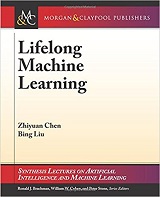
|
FreeComputerBooks.com
Links to Free Computer, Mathematics, Technical Books all over the World
|
|
- Title Lifelong Machine Learning
- Author(s) Zhiyuan Chen (Author), Bing Liu (Author)
- Publisher: Morgan & Claypool; 1st Ed (2016); 2nd Ed (2018); eBook (Final Draft)
- Hardcover 146 pages
- eBook PDF (145 pages)
- Language: English
- ISBN-10: 1681733048
- ISBN-13: 978-1681733043
- Share This:

|
This book is an introduction to an advanced Machine Learning paradigm that continuously learns by accumulating past knowledge that it then uses in future learning and problem solving. In contrast, the current dominant machine learning paradigm learns in isolation: given a training dataset, it runs a machine learning algorithm on the dataset to produce a model that is then used in its intended application.
It makes no attempt to retain the learned knowledge and use it in subsequent learning. Unlike this isolated system, humans learn effectively with only a few examples precisely because our learning is very knowledge-driven: the knowledge learned in the past helps us learn new things with little data or effort. Lifelong learning aims to emulate this capability, because without it, an AI system cannot be considered truly intelligent.
About the Authors- Zhiyuan Chen is a Staff Software Engineer & Tech Lead Manager at Google. He completed his Ph.D., titled Lifelong Machine Learning for Topic Modeling and Classification, at the University of Illinois at Chicago under the direction of Professor Bing Liu.
- Bing Liu is a Distinguished Professor of Computer Science at the University of Illinois at Chicago.
- Machine Learning
- Neural Networks and Deep Learning
- Artificial Intelligence
- Data Analysis and Data Mining

- Lifelong Machine Learning (Zhiyuan Chen, et al.)
- The Mirror Site (1) - PDF
- The Book Homepage (PDF, Resources, etc.)
-
 Mathematics for Machine Learning (Marc P. Deisenroth, et al.)
Mathematics for Machine Learning (Marc P. Deisenroth, et al.)
This self contained textbook bridges the gap between mathematical and machine learning texts, introducing the mathematical concepts with a minimum of prerequisites. It provides a beautiful exposition of the mathematics underpinning modern machine learning.
-
 Fairness and Machine Learning: Limitations and Opportunities
Fairness and Machine Learning: Limitations and Opportunities
This book is an introduction to the intellectual foundations of this recently emergent field, drawing on a diverse range of disciplinary perspectives to identify the opportunities and hazards of automated decision-making.
-
 The Hundred-Page Machine Learning Book (Andriy Burkov)
The Hundred-Page Machine Learning Book (Andriy Burkov)
Everything you really need to know in Machine Learning in a hundred pages! This book provides a great practical guide to get started and execute on ML within a few days without necessarily knowing much about ML apriori.
-
 Introduction to Statistical Learning: with Applications in Python
Introduction to Statistical Learning: with Applications in Python
This book covers the same materials as Introduction to Statistical Learning: with Applications in R (ISLR) but with labs implemented in Python. These labs will be useful both for Python novices, as well as experienced users.
-
 The Shallow and the Deep: Old School Machine Learning
The Shallow and the Deep: Old School Machine Learning
This book is a collection of lecture notes that offers an accessible introduction to Neural Networks and machine learning in general. The focus lies on classical machine learning techniques, with a bias towards classification and regression.
-
 Machine Learning from Scratch (Danny Friedman)
Machine Learning from Scratch (Danny Friedman)
This book covers the building blocks of the most common methods in machine learning. This set of methods is like a toolbox for machine learning engineers. Those entering the field of machine learning should feel comfortable with this toolbox.
-
 Foundations of Machine Learning (Mehryar Mohri, et al)
Foundations of Machine Learning (Mehryar Mohri, et al)
This book is a general introduction to machine learning. It covers fundamental modern topics in machine learning while providing the theoretical basis and conceptual tools needed for the discussion and justification of algorithms.
-
 Distributional Reinforcement Learning (Marc G. Bellemare, et al)
Distributional Reinforcement Learning (Marc G. Bellemare, et al)
Distributional reinforcement learning is a new mathematical formalism for thinking about decisions. This first comprehensive guide provides a new mathematical formalism for thinking about decisions from a probabilistic perspective.





